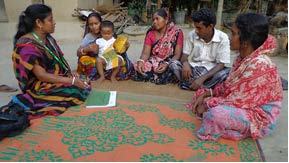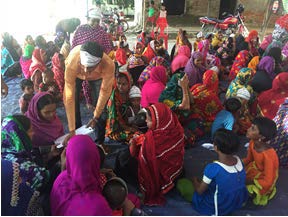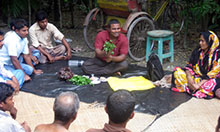
Nutrition Brothers and Sisters
Not many people can say they have a “Nutrition Sister” and a “Nutrition Brother.” In Bangladesh, participants in the farmer nutrition schools (FNS) implemented by SPRING, came to look forward to visits by SPRING’s union facilitators who help reinforce the nutrition and hygiene practices learned through FNS. These visits earned the facilitators the nicknames Pushti Apa (Nutrition Sister) and Pushti Bhai (Nutrition Brother).
Not Just an Ordinary School
SPRING launched FNS in Bangladesh in 2012. Farmer nutrition schools are an innovative, group-based learning approach targeting resource-poor households with pregnant and lactating women and women who have children under the age of two. The goal of the schools is to promote good nutrition and hygiene practices in the community and enhance access to diverse nutrient-rich vegetables, poultry, and fish. SPRING hired union facilitators from local non-governmental organizations (NGOs) to visit communities after completion of FNS training to promote healthy household food consumption, equitable intra-household food distribution, and appropriate dietary diversity, particularly for women and children.
For Mr. Ripon Kumar Saha, a Pushti Bhai, being a union facilitator was more than just a job. “Working for SPRING has been a life-changing experience for me. The knowledge that I have acquired on health and nutrition here has been highly beneficial in my personal life.”
I have learned everything about health and hygiene from SPRING. We know how to grow papayas, yardlong beans, and spinach. We all have wonderful vegetable gardens and have learned about rearing chickens and fish. We also have tippy taps!
--Tahomina Begum, an FNS graduate
Ms. Oloka Biswas, a Pushti Apa, says “It was a great job! […]This workplace has a strong belief in gender equality. Everyone on our team was like a brother or a sister. We had very strong co-operation and helped each other out.”
SPRING worked closely with the union facilitators and their respective organizations to ensure that the skills and knowledge they gained will enable their organizations to provide effective community-based nutrition activities after SPRING’s work has finished.

Seeing the Fruits of Their Labor
In the SPRING project working area, which includes 40 upazilas (sub-districts) in Khulna and Barisal Divisions, more than 80 percent of households are now equipped with tippy taps for handwashing and every household now has its own source of food from poultry, horticulture, and/or fish. These changes reflect social and behavioral shifts that are improving hygiene and nutrition. In these upazilas, it is almost impossible to find a household unaware of the essential diet for pregnant and lactating women and for children under two years of age.
Without a doubt, Pushti Apas and Pushti Bhais were essential in bringing nutrition messages to such a large audience. As a SPRING staff member pointed out, “Without the union facilitators’ large-scale reach, project implementation at this scale would not have been possible. They have made the FNS sessions a success, which allowed us to focus on enhancing capacity building within the government.” He further adds, “They visited each and every one of these households and formed one-on-one relationships with FNS members who promoted social and behavioral change in essential nutrition and hygiene practices. Because of their devotion, SPRING’s messages have made a place in the hearts of the local people.”
With the approaching completion of the SPRING project in Bangladesh, all union facilitators concluded their duties in late June 2016. Nonetheless, their presence is felt through the bountiful vegetable gardens, thriving ponds, productive hatching pots, and healthier families they left behind.
